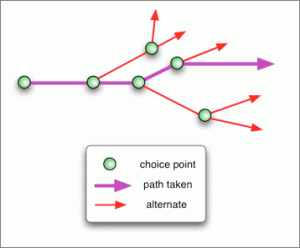 I’m thinking about what is probably the most common layman understanding of the multiverse, the “parallel universes” theme that frequently shows up in science fiction (e.g. Sliders, select episodes of every Star Trek show ever) and fantasy (e.g. The Chronicles of Narnia). In particular, the two aforementioned science fiction programs employ the idea that upon reaching a choice with two possibilites, both are actually selected, and reality bifurcates, as in the figure above. In fiction, a common plot device is the unusual mechanism (whether technological or supernatural) that allows travel from one world-branch to another. Such a mechanism must be unusual, because we don’t experience such reality shifts in daily life.
I’m thinking about what is probably the most common layman understanding of the multiverse, the “parallel universes” theme that frequently shows up in science fiction (e.g. Sliders, select episodes of every Star Trek show ever) and fantasy (e.g. The Chronicles of Narnia). In particular, the two aforementioned science fiction programs employ the idea that upon reaching a choice with two possibilites, both are actually selected, and reality bifurcates, as in the figure above. In fiction, a common plot device is the unusual mechanism (whether technological or supernatural) that allows travel from one world-branch to another. Such a mechanism must be unusual, because we don’t experience such reality shifts in daily life.
What would salvation look like in such a reality? For every choice Abraham ever made, there would be one or more additional Abrahams. Actually it’s worse; the number of Abrahams would be roughly the factorial of the number of choices Abraham faced. Assuming for a moment that most choices are binary (i.e. there are only two options), that the average person faces 1000 choices a day, and that the Bible is correct as to Abraham’s age at death, that gives [thanks, Wolfram!] about 10^(10^9) Abrahams. That’s a one followed by one billion zeros. Abraham alone would require many mansions in every degree of every kingdom, and probably a good bunch in outer darkness as well. Note that this only includes bifurcations caused by Abraham’s choices; the full picture would be much more complicated if we considered the choices made by other sentient beings alive during Abraham’s lifetime. That’s a whole lot of multiplying entities needlessly, so I don’t like it.
Instead consider a version in which for a given choice all possibilities exist in a sense, but only one is actually chosen. Perhaps this is not actually different from how you picture reality without all this multiverse nonsense, but bear with me. I had a striking mental image of a branching tree of possibilities, with most branches dark except for the highlighted pathway from the root to the present moment, which moves along the tree as time proceeds. The following image gives the same idea, only it’s not nearly as pretty as what I imagined.

Here’s the thing: in this scenario God would not have to do any fancy calculations to discover all the potential future states. He could be located outside of this branching structure, able to observe any part or the whole of it, and yet remain completely inside linear time. Thus this view is compatible with Open Theism (the idea that the future is completely undetermined and unknown, even to God), which, as Geoff J. has so stridently argued over at New Cool Thang, is itself compatible with libertarian free will and Mormonism.
Among all the obvious questions to which I hope you will provide answers (Is this blog post self-consistent? Is it even clear? What are your thoughts?), I hope you’ll consider this one: are the old, unfruitful branches of such a structure plucked off, cast into the fire and burned?

 I’m thinking about what is probably the most common layman understanding of the multiverse, the “parallel universes” theme that frequently shows up in science fiction (e.g. Sliders, select episodes of every Star Trek show ever) and fantasy (e.g. The Chronicles of Narnia). In particular, the two aforementioned science fiction programs employ the idea that upon reaching a choice with two possibilites, both are actually selected, and reality bifurcates, as in the figure above. In fiction, a common plot device is the unusual mechanism (whether technological or supernatural) that allows travel from one world-branch to another. Such a mechanism must be unusual, because we don’t experience such reality shifts in daily life.
I’m thinking about what is probably the most common layman understanding of the multiverse, the “parallel universes” theme that frequently shows up in science fiction (e.g. Sliders, select episodes of every Star Trek show ever) and fantasy (e.g. The Chronicles of Narnia). In particular, the two aforementioned science fiction programs employ the idea that upon reaching a choice with two possibilites, both are actually selected, and reality bifurcates, as in the figure above. In fiction, a common plot device is the unusual mechanism (whether technological or supernatural) that allows travel from one world-branch to another. Such a mechanism must be unusual, because we don’t experience such reality shifts in daily life.
